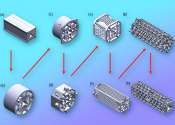Robert W. Gore, the inventor of Gore-Tex fabric, dead at 83
Robert W. Gore, whose invention of what created the breathable-yet-waterproof fabric known as Gore-Tex revolutionized outdoor wear and helped spawn uses in numerous other fields, has died. He was 83.
Sep 20, 2020
0
139









